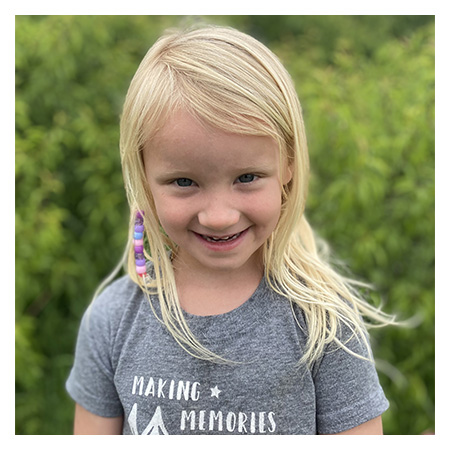Treating Retrograde Cricopharyngeal Dysfunction in a Young Child
 Brave Josey, the four-year-old daughter of Erica and Daniel Josey, was in and out of the hospital in Dallas with misdiagnoses when her parents searched online and learned about retrograde cricopharyngeal dysfunction (RCPD), also known as no-burp syndrome. Brave was so bloated during the day from swallowing air that she struggled to eat and began to lose weight.
Brave Josey, the four-year-old daughter of Erica and Daniel Josey, was in and out of the hospital in Dallas with misdiagnoses when her parents searched online and learned about retrograde cricopharyngeal dysfunction (RCPD), also known as no-burp syndrome. Brave was so bloated during the day from swallowing air that she struggled to eat and began to lose weight.
“She was uncomfortable and fussy, and by the end of the day, she looked like she was nine months pregnant,” Erica Josey says. “We finally concluded on our own that she was unable to burp, and one day we found an article about an RPCD case treated successfully by Dr. Tritter.” Andrew Tritter, MD, is director of the Texas Voice Performance Institute™ and an assistant professor in the Department of Otorhinolaryngology at McGovern Medical School at UTHealth Houston. The institute provides comprehensive medical and surgical treatment of patients with voice and swallowing disorders.
Dr. Tritter treats eight to 10 RCPD patients a month, who come to him from around the country. “RCPD was first described in the literature about five years ago and has come to light by people sharing their stories through social media,” he says. “People are learning that a Botox® injection to the cricopharyngeus muscle in the throat will cure the dysfunction for most people.”
The Joseys contacted Dr. Tritter, who gave them the names of physicians in Dallas who had experience treating RCPD. “All had experience only with adults and none had privileges at a children’s hospital,” Josey says. “By then, Brave had lost a significant amount of weight and we were worried, so we drove to Houston. We immediately appreciated Dr. Tritter’s attitude. Instead of telling us what needed to be done, he educated us about her condition, informed us of the risks of treatment, and let us make our own decision. When we said yes, he got her into the OR quickly.”
Although RCPD was not officially named until 2019, case reports published as long ago as the 1980s have described the condition. “We know it’s been around for a long time and is likely to be more common than we realize,” Dr. Tritter says. “Our department is in the process of developing a population prevalence study. To date, most cases treated and published have involved adults. Although I’ve treated at least 10 adolescents, the youngest child I’ve seen before meeting Brave was a 10-year-old. There is very little information reported on young kids with retrograde cricopharyngeal dysfunction, but I have read about a six-year-old child who had a remarkable improvement after injection with Botox.”
Symptoms and severity can vary, although nearly all patients are unable to burp or produce only small and unsatisfactory burps. Many have a feeling of air trapped in the chest and abdomen, accompanied by audible gurgling sounds in the throat and flatulence.
“Brave has had a belly since she was born, but we thought it was just her particular anatomy,” her mother says. “Now she has a flat belly and regained five pounds in the two months following the injection. Her treatment with Dr. Tritter was completely life changing, and we are so grateful.”